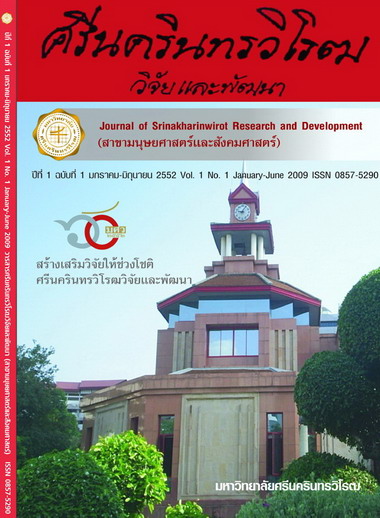ประเพณีผีมอญกับวิถีชีวิตของชุมชน ตำบลพุดซา อำเภอเมือง จังหวัดนครราชสีมา (A Study of Praying Homage Tradition (Peemon) in Relevant to the Community way of Life at Tumbon Putsa District Muang Nakhon Ratchasima Provice)
Keywords:
Praying homage tradition, Peemon, community way of life, patterns and factors of Peemon tradition, community life diagramAbstract
บทคัดย่อ การวิจัยครั้งนี้มีวัตถุประสงค์เพื่อศึกษาสืบค้นประวัติศาสตร์ท้องถิ่นจากประเพณีผีมอญ ตลอดจนศึกษารูปแบบและองค์ประกอบประเพณีผีมอญที่สัมพันธ์กับวิถีชีวิตชุมชน และเพื่อศึกษาความต้องการแผนชีวิตของชุมชนตำบลพุดซา การวิจัยครั้งนี้ใช้การวิจัยเชิงคุณภาพจากกลุ่มตัวอย่างที่ประกอบด้วยผู้นำชุมชน ผู้รู้ ผู้อาวุโส ผู้ที่มีส่วนเกี่ยวข้องกับประเพณีผีมอญ ประชาชนและเยาวชนในชุมชน โดยใช้การค้นคว้าจากเอกสาร การสังเกต การสัมภาษณ์แบบกึ่งโครงสร้างและไม่มีโครงสร้าง และการสนทนากลุ่มเป็นเครื่องมือในการเก็บข้อมูล การวิเคราะห์ข้อมูลใช้การวิเคราะห์เนื้อหาแบบพรรณนา
ผลการศึกษาพบว่า ประเพณีผีมอญเป็นวัฒนธรรมพื้นบ้าน เป็นวิถีชีวิตและระบบความเชื่อของคนในชุมชนตำบลพุดซา มานานกว่า 100 ปี ประเพณีผีมอญสร้างสำนึกชาติพันธุ์ให้กับคนในชุมชน โดยเป็นประเพณีที่ทำให้คนในตำบลพุดซามีเอกลักษณ์ที่ไม่เหมือนกับคนในตำบลใกล้เคียง มีความภาคภูมิใจในประวัติศาสตร์ของตนเอง และประเพณีผีมอญยังเป็นเครื่องยึดโยงคนในชุมชนให้มีความเป็นกลุ่มก้อน คนในชุมชนมีลักษณะไทยโคราชโดยไม่พบลักษณะความเป็นมอญ
ประเพณีผีมอญมีบทบาทสำคัญอย่างมากต่อวิถีการดำเนินชีวิตของคนในชุมชน โดยเฉพาะอย่างยิ่งความเชื่อเรื่อง “ผีบรรพบุรุษ” ที่สะท้อนให้เห็นภูมิปัญญาในเรื่องการจัดการทางสังคมของคนในชุมชนตำบลพุดซา ได้แก่ การสร้างระบบเคารพผู้อาวุโส การสร้างและกระชับความสัมพันธ์ระหว่างเครือญาติและคนในชุมชน การควบคุมความประพฤติคนในชุมชน นอกจากนี้ พบว่า เพศหญิงเป็นเพศที่มีบทบาทหน้าที่สำคัญในการประกอบพิธีกรรมตามประเพณี
คนในชุมชนตำบลพุดซามีความต้องการแผนชีวิตแบบดั้งเดิมซึ่งเป็นวิถีชีวิตแบบพอเพียง ต้องการให้คนในชุมชนมีความรัก ความสามัคคีและสุขภาพแข็งแรง ครอบครัวอบอุ่นไม่มีการหย่าร้าง เด็กและเยาวชนมีความรู้ความประพฤติดีและเคารพผู้อาวุโส โดยไม่พบความต้องการด้านทรัพย์สินแต่ประการใด
Abstract
The purpose of this research was to explore the local history of the tradition of praying homage. It also examined the cultural patterns and social factors that relate the tradition to the community’s way of life and to study needs to construct a life diagram of Tumbon Putsa community.
The research project employed a qualitative analysis of data obtained from a sample group comprised of community leaders, gurus, seniors, those directly involved with the tradition, as well as adults and children within the community. Information from existing documents, researcher observations, semi-structured and non-structured interviews and group discussions were the primary sources of the research data. Descriptive analysis was used in the assessment of data.
The research results showed that
The praying homage tradition (Peemon) is a local culture and a community belief of people in Pudsa district for more than 100 years. Peemon cultivates an awareness among the community members of the origins of the people. It gives the people of Pudsa sub-district a unique identity and distinguishes them from those in nearby districts. The Pudsa residents are proud of their local history. Peemon binds the souls of the people of the community togrther. Furthermore, it was found that the people in Pudsa sub-district look more like Thai Korat people.
Peemon plays an important role in the community’s way of life. The beliefs about ancestral ghosts are quite strong. Peemon reflects how the people in Pudsa sub-district govern their community in creating a seniority system, forming bonds among relatives, connecting people across the community, and watching over their behavior. It is also foundrd that females of the community play important roles in the praying homage ceremony.
People in Pudsa district want to have traditional sufficiency ways of living. They want people in their community to have love, harmony, good health. They want warmth within families, their children to be well-behaved and to show respect to adults. Accumulating wealth is not what motivates them in their lives.
Downloads
Downloads
Published
How to Cite
Issue
Section
License
Srinakharinwirot Research and Development Journal of Humanities and Social Sciences is licensed Under a Creative Commons Attribution-NonCommercial-NoDerivs 4.0 International (CC-BY-NC-ND 4.0) License, Unless Otherwise Stated. Please Read Journal Policies Page for More Information on Open Access, Copyright and Permissions.



